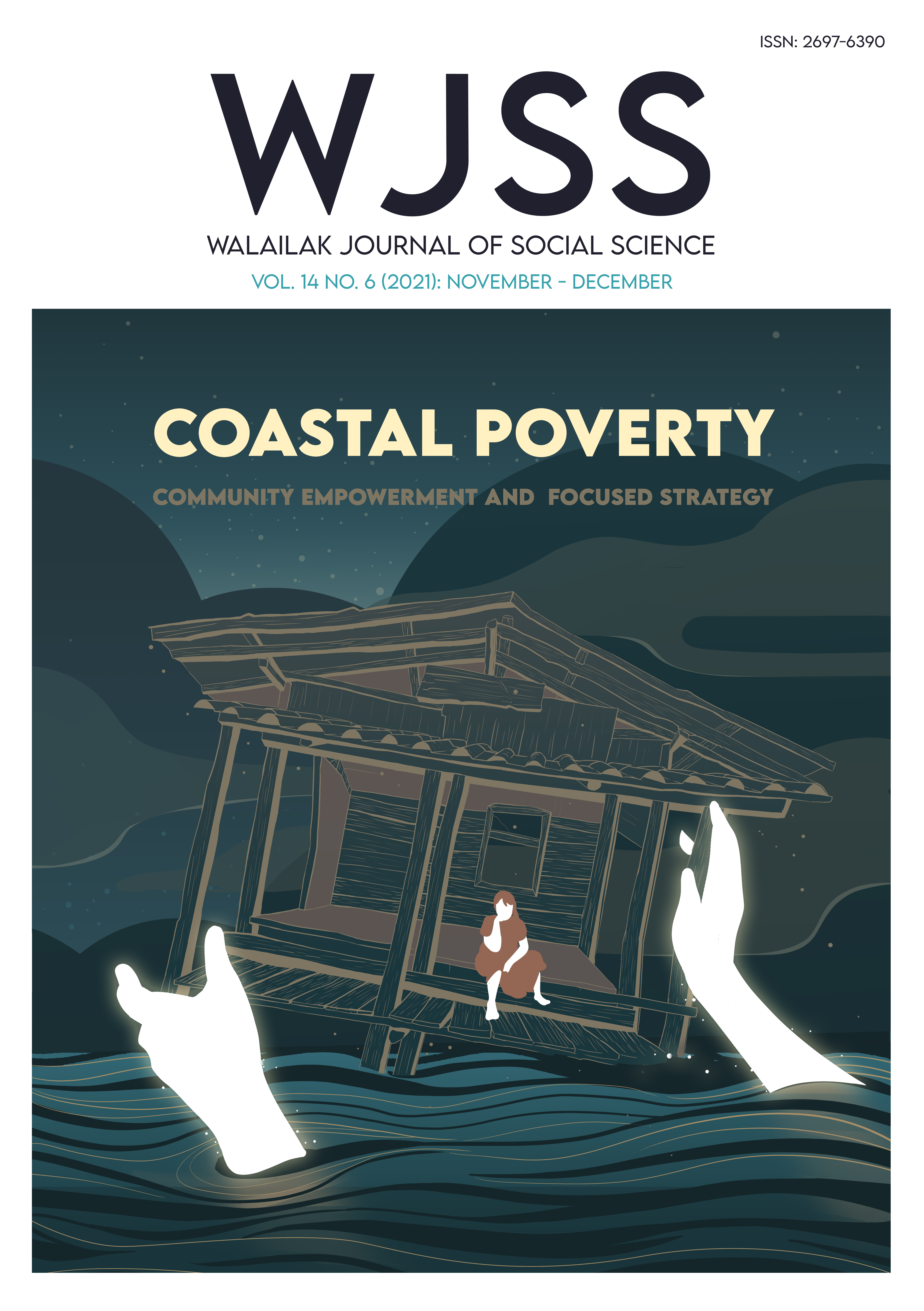Reinventing Focused-Strategy for Coastal Community Empowerment
Main Article Content
Abstract
This paper provides a focused and implementable strategy for Community empowerment to alleviate poverty. This research was carried out in a coastal community on a remote island in an archipelagic country (Indonesia). This qualitative research used force field analysis to produce an appropriate strategy for alleviating community poverty. We indicated that there had been an improvement in the condition of the people - from below the poverty line to being on the poverty line. The desired condition was empowered communities that could get out of the poverty trap. By analyzing the force movements, we found that the movement of the driving forces was a little stronger than that of the restraining forces. This finding meant that the community could develop in a positive direction in the future. We recommend a focused and implementable strategy for strengthening the education of people in the community. This approach supports factors that drive the empowerment of the community while simultaneously reducing the restraining factors.
Article Details
Copyright: CC BY-NC-ND 4.0
References
Ab-Rahim, R., & Shah, S. M. (2019). Does NGO microfinance alleviate poverty in Pakistan? A quasi-experimental approach. International Journal of Business and Society, 20(3), 888-907.
Adamson, D., & Bromiley, R. (2013). Community empowerment: Learning from practice in community regeneration. International Journal of Public Sector Management, 26(3), 190-202.
Adamson, D. (2010). Community empowerment Identifying the barriers to ‘‘purposeful’’ citizen participation. International Journal of Sociology and Social Policy, 30(3-4), 114-126.
Ahmad, M. S., & Abu Talib, N. B. (2015). Empowering local communities: Decentralization, empowerment and community driven development. Qual Quant, 49, 827-838.
Al Nasser, A. D., & Al Hallaq, S. S. (2019). Impact of human poverty on the Human Development Index in Jordan within the period 2003-2016. International Journal of Business and Society, 20(2), 552-562.
Badan Informasi Geospasial Pusat Hidrografi dan Oseanografi TNI AL. (2019). Rujukan nasional data kewilayahan Indonesia. Badan Informasi Geospasial Pusat Hidrografi dan Oseanografi TNI AL.
Banerjee, A., Banerji, R., Berry, J., Duflo, E., Kannan, H., Mukerji, S., Shotland, M., & Walton, M. (2017). From proof of concept to scalable policies: Challenges and Solutions, with an Application. Journal of Economic Perspectives, 31(4), 73-102.
Banerjee, A. V., & Duflo, E. (2017). Poor economics: A radical thinking of the way to fight global poverty. New York: Public Affairs.
Burnes, B., & Cooke, B. (2012). Kurt Lewin’s field theory: A review and re-evaluation. International Journal of Management Reviews, 15(4), 408-425.
Chambers, R. (1983). Rural development: Putting the last first. London: Pearson Education.
Deepa, & Murthy, P. S. S. (2019). Economic analysis of women empowerment through value addition of jackfruit in Bengaluru Rural District. Economic Affairs, 64(2), 401-406.
Duflo, E. (2004). The medium run effects of educational expansion: Evidence from a large school construction program in Indonesia. Journal of Development Economics, 74, 163-197.
Friedmann, J. (1992). Empowerment: The politics of alternative development. Cambridge: Blackwell Publishers.
Hijjang, P., Ismail, A., Marhadi, A., Frank, S. A. K., Sokoy, F., & Idris, U. (2018). Puyakhabhu: Local wisdom values in environmental management at Sentani indigenous community in Jayapura Regency, Papua. International Journal of Arts & Sciences, 11(01), 59-66.
Ife, J. (1995). Community development: Creating community alternatives - vision, analysis and practice. Melbourne: Addison Wesley Longman Australia.
Ife, J. (2009). Human rights from below: Achieving rights through community development. Cambridge: Cambridge University Press.
Jowah, L. E. (2019). Seeking for a relevant and contextual approach to economic development, an entrepreneurship model for Africa. Journal of Asia Entrepreneurship and Sustainability, 15(1), 67-103.
Msutwana, N., & Nyawo, J. C. (2019). Assessment of comprehensive rural development programme in empowering rural women at Umhlontlo local municipality, Eastern cape province. Journal of Politics, Economics and Society, 9(SI), 155-174.
Narayan-Parker, D. (2005). Measuring empowerment: Cross-disciplinary perspectives. World Bank Publications.
Natalia, M., & Alie, M. M. (2014). Kajian Kemiskinan Pesisir di Kota Semarang (Studi Kasus: Kampung Nelayan Tambak Lorok). Teknik PWK (Perencanaan Wilayah Kota), 3(1), 50-59.
Nayak, A. K., & Panigrahi, P. K. (2020). Participation in self-help groups and empowerment of women: A structural model analysis. The Journal of Developing Areas, 51(1), 19-37.
Schwering, R. E. (2003). Focusing leadership through force field analysis: New variations on a venerable planning tool. Leadership & Organization Development Journal, 24(7), 361-370.
Singh, P. K., & Chudasama, H. (2020). Evaluating poverty alleviation strategies in a developing country. PLoS ONE, 15(1), e0227176.
Statistical Yearbook of Indonesia (2020). BPS-Statistics Indonesia.
Swanson, D. J., & Creed, A. S. (2014). Sharpening the focus of force field analysis. Journal of Change Management, 14(1), 28-47.
Swinton, L. (2016). Kurt Lewin’s Force Field Analysis: Decision making made easy. Retrieved from https://mftrou.com/wp-content/uploads/2016/11/lewins-force-field-analysis.pdf
Tauzer, E., Borbor-Cordova, M. J., Mendoza, J., De La Cuadra, T., Cunalata, J., & Stewart-Ibarra, A. M. (2019). A participatory community case study of periurban coastal flood vulnerability in southern Ecuador. PLoS One, 14(10), e0224171.
Varghese, T. (2019). The Impact of women’s political empowerment policy: A perspective from the Idukki District of Kerala. Public Policy and Administration, 18(3), 59-72.
Wang, S., & Crosby, A. (2019). Politics or professionalism to the rescue? The Friedrich-Finer debate in the context of state intervention in Michigan. Public Affairs Quarterly, 43(4), 555-583.
Waridin, Dzulkhijiana, A., & Mafruhah, I. (2018). Community empowerment in rural infrastructure development program. Economic Journal of Emerging Markets, 10(1), 8-14.
Wisesa, A., Purnawan, V., & Wulansari, A. (2017). Building a self-sustaining learning center through an integrated multidimensional community development program: A case study in an Indonesian village. International Journal of Business and Society, 18(S2), 339-352.
Zakrzewska, M. (2017). The role of social participation in the concept of good governance: a theoretical approach. Public Policy and Administration, 16(4), 529-537.


